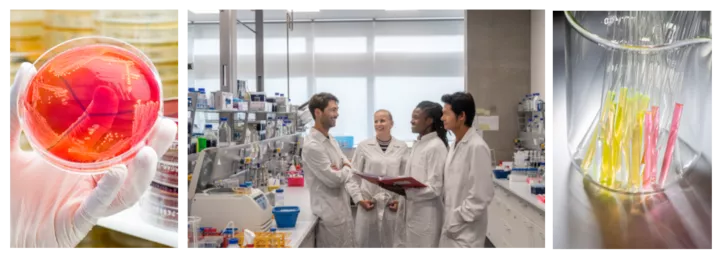ZIEL Graduate Programme

ZIEL maintains a thematically focused doctoral program with five PhD candidates and several junior research groups. The PhD thesis are designed as tandem projects between several ZIEL members and are supported by them as mentors. These projects generate synergies across faculty and institute boundaries and promote interdisciplinary collaboration between the groups.

Technical University of Munich
ZIEL - Core Facility Human Studies
Prof. Dr. Thomas Skurk & Prof. Dr. Veronika Somoza
Title of the PhD Thesis
Metabolic effects and chemical sensing in response to algae protein: a human intervention study
Projectdescription
The rapid development of nutritional metabolomics which aims at investigating perturbations of the human metabolome by specific nutrients or foods, has identified several biomarkers that serve as indicators of dietary effects on target populations or patients [1]. Proteins, among other important macronutrients, have been a primary target of nutritional research for their indispensable role in human health. Common sources of protein such as animal-based protein have been associated with increasing ethical and environmental concerns. Therefore, there have been efforts to search for novel protein sources and algae is a promising candidate, offering potential health benefits alongside environmental advantages [2].
Algae are marine photosynthetic organisms that have a long history of being used in foods, for example in China and Japan. Algae have very high protein content, with some species containing up to 60-70% protein by dry weight, comparable to conventional protein sources like meat and soybeans [2]. The current data on the quality of algae protein as a nutrient and its metabolic effects in comparison to other conventional sources are limited. A more comprehensive understanding of algae protein is needed.
This project aims to build a comprehensive metabolome profile including amino acids and various immunological markers by a human intervention study. In addition, the sensory response to the algae protein will also be investigated. This project follows the standard pipeline for metabolic analyses in human nutritional studies proposed by Marynka M. Ulaszewska et al. Such a standardized process allowed the comparison between the data generated by this study to other previous studies that followed the same pipeline [1,3].
[1] Ulaszewska, M.M., et al., Nutrimetabolomics: An Integrative Action for Metabolomic Analyses in Human Nutritional Studies. Mol Nutr Food Res, 2019. 63(1): p. e1800384.
[2] Wang, Y., S.M. Tibbetts, and P.J. McGinn, Microalgae as Sources of High-Quality Protein for Human Food and Protein Supplements. Foods, 2021. 10(12).
[3] Giesbertz, P., et al., Specificity, Dose Dependency, and Kinetics of Markers of Chicken and Beef Intake Using Targeted Quantitative LC-MS/MS: A Human Intervention Trial. Mol Nutr Food Res, 2020. 64(5): p. e1900921.

Helmholtz Center Munich
Analytical Biogeochemistry
Comparative Microbiome Analysis
Technical University of Munich
Professur für Umweltmikrobiologie
Prof. Dr. Phillipe Schmitt-Kopplin & Prof. Dr. Michael Schloter
Thesis Title
Impact of Flavor Enhancers on the Structure and Function of the Intestinal Microbiome
Projectdescription
The human body is co-evolved with microbes in its gastrointestinal tract. The composition of the bacterial community and the metabolites produced by the gut microbiota have an effect on human health5. The balance and diversity of human gut microbiota are affected by a variety of complex factors, including dietary and non-dietary factors7.
In the food production industry, complex processes lead to the alteration or loss of the original taste of the food. Therefore, flavor enhancers are used to compensate for flavor loss. Flavor enhancers are mainly a combination of the amino acid glutamate, and/or the nucleotides inosinate and guanylate, with minerals such as sodium and potassium acting on taste receptors and creating the general term of the taste “Umami”.
According to the German Society for Nutrition (DGE) with a normal diet, no harmful influence of flavor enhancers is to be expected in healthy people. Nevertheless, it cannot be ruled out today that there are people who react sensitively to flavor enhancers2.
So far, only one comprehensive study, by Peng et al. (2019), was performed to evaluate the effects of flavor enhancers on the human gut microbiome, and they focused on metagenomics sequencing evaluating the consequences of monosodium glutamate on the gut microbiota. This study indicated no clear response pattern and significant changes in the level of bacterial community structure and function due to the low number of participants and the high individual variations3.
In the frame of this Project, we want to focus on the level of microbial transcriptomes and metabolomes and study the impact of flavor enhancers on the phenotype of the gut microbiome. We will use The Simulator of the Human Intestinal Microbial Ecosystem (SHIME®)1, which serves as a crucial in vitro system for nutritional research, providing a stable microbial community reflective of the human gut microbiota4,6.
[1] Molly, K., Woestyne, M. V., Smet, I. D., & Verstraete, W. (1994). Validation of the simulator of the human intestinal microbial ecosystem (SHIME) reactor using microorganism-associated activities. Microbial ecology in health and disease, 7(4), 191-200.
[2] Niaz, K., Zaplatic, E., & Spoor, J. (2018). Extensive use of monosodium glutamate: A threat to public health?. EXCLI journal, 17, 273.
[3] Peng, Q., Huo, D., Ma, C., Jiang, S., Wang, L., & Zhang, J. (2018). Monosodium glutamate induces limited modulation in gut microbiota. Journal of Functional Foods, 49, 493-500.
[4] Salgaço, M. K., Perina, N. P., Tomé, T. M., Mosquera, E. M. B., Lazarini, T., Sartoratto, A., & Sivieri, K. (2021). Probiotic infant cereal improves children’s gut microbiota: Insights using the Simulator of Human Intestinal Microbial Ecosystem (SHIME®). Food Research International, 143, 110292.
[5] Singhvi, N., Gupta, V., Gaur, M., Sharma, V., Puri, A., Singh, Y., ... & Lal, R. (2020). Interplay of human gut microbiome in health and wellness. Indian journal of microbiology, 60, 26-36.
[6] Van de Wiele, T., Van den Abbeele, P., Ossieur, W., Possemiers, S., & Marzorati, M. (2015). The simulator of the human intestinal microbial ecosystem (SHIME®). The Impact of Food Bioactives on Health: in vitro and ex vivo models, 305-317.
[7] Zhou, X., Qiao, K., Wu, H., & Zhang, Y. (2023). The Impact of Food Additives on the Abundance and Composition of Gut Microbiota. Molecules, 28(2), 631.

Technical University of Munich
ZIEL – Institute for Food & Health
ZIEL - Working Group Westernization of Diet and the Gut ZIEL - Working Group Public Health Nutrition ZIEL - Core Facility Human Studies
Dr. Sören Ocvirk, Prof. Dr. Kurt Gedrich, Prof. Dr. Thomas Skurk
Title of the PhD Thesis
A Dual Perspective on Functionalization of Resistant Starch
Project Description
Resistant starch (RS) is a fraction of starch that resists digestion in the small intestine of healthy individuals and passes into the large intestine, providing a substrate for bacterial fermentation1. The fermentation of RS to short-chain fatty acids (SCFA) by the gut microbiota plays a critical role in promoting gut health2. It is hypothesized that people who eat a “Western” diet have a lower microbial capacity to metabolize RS to SCFA than people who eat a traditional, high-fiber diet, such as in sub-Saharan Africa3. We are conducting a human to test this hypothesis.
In the field of food technology, the various types of RS are playing an increasingly important role. The development of innovative food applications using RS is not only due to the unique techno-functionality, such as the low water holding capacity and the high-water binding capacity but also to the good organoleptic properties, such as the good mouthfeel due to the small particle size and the neutral taste. In particular, RS type 3, formed by retrogradation and produced using various food processing techniques, offers great potential as a novel and “invisible” source of dietary fiber in Western food products4.
In the framework of a highly interdisciplinary team, we aim to explore the functionalization of RS from the perspective of food technology and the gut microbiome.
References
[1] Asp, N. G. Preface: Resistant starch. Proceeding of the 2nd plenary meeting of EURESTA: European Flair Concerted Action No.11 (Cost 911) on physiological implication of the consumption of resistant starch in man. European Journal of Clinical Nutrition 1992, 46, Suppl 2, S1-148.
[2] Garg, N. K.; Singh, A.; Chaudhary, D. P. Resistant Starch: A Potential Impact on Human Health. International Journal of Current Microbiology and Applied Sciences 2017, 6(5), 2046-2057.
[3] Wilson, A. S; Koller, K. R.; Ramaboli, M. C.; Nesengani, L. T.; Ocvirk, S.; Chen, C.; Flanagan, C. A.; Sapp, F. R.; Merritt, Z. T.; Bhatti, F.; Thomas, T. K.; O’Keffe, S. J. D. Diet and the Human Gut Microbiome: An International Review. Digestive Diseases and Sciences 2020, 65(3), 723-740.
[4] Walsh, S. K.; Lucey, A.; Walter, J.; Zannini, E.; Arendt, E. K. Resistant starch – An accessible fiber ingredient acceptable to the Western palate. Comprehensive Reviews in Food Science and Food Safety 2022, 21(3), 2930-2955.

Prof. Dr. Dirk Haller & Prof. Dr. Veronika Somoza
Title of the PhD Thesis
Deciphering the mechanistic impact of flavor stimuli from microalgae on microbiome-host interactions in humans
Project description
Microalgae such as Chlorella sp. have been flagged as a next-generation superfood due to the high macro and micronutrient content1. This aspect makes them particularly appealing to individuals following a vegan or vegetarian lifestyle. The gut microbiome plays a fundamental role in regulating human health, and one of the key mechanisms by which bacterial communities influence host physiology is through the production and conversion of small molecules derived from ingested dietary compounds2.
First studies demonstrate that distinct strains or bacterial communities (i) metabolize nutrients after digestion, (ii) form, degrade, or convert metabolites from food after its intake or at the same time, and (iii) are affected in their growth or composition3. However, little is known about the influence of microalgae (Chlorella sp.) on those effects. In this project, we aim to understand how microalgae and its metabolites interact with fecal microbial communities in the gastrointestinal environment of healthy human individuals (representative of the human phylogenic diversity) and vice versa as well as with synthetic complex bacterial consortia4.
To evaluate this, a human intervention trial as well as chemostat and cell model experiments will be performed.
References
[1] Vrenna M, Peruccio PP, Liu X, Zhong F, Sun Y. Microalgae as Future Superfoods: Fostering Adoption through Practice-Based Design Research. Sustainability. 2021; 13(5):2848.
[2] Sittipo P, Shim JW, Lee YK. Microbial Metabolites Determine Host Health and the Status of Some Diseases. Int J Mol Sci. 2019;20(21):5296. Published 2019 Oct 24.
[3] Rowland I, Gibson G, Heinken A, et al. Gut microbiota functions: metabolism of nutrients and other food components. Eur J Nutr. 2018;57(1):1-24.
[4] Cheng AG, Ho PY, Aranda-Díaz A, et al. Design, construction, and in vivo augmentation of a complex gut microbiome. Cell. 2022;185(19):3617-3636.e19.
Prof. Dr. Corinna Dawid & Prof. Dr. Thomas Brück
Title of the PhD Thesis
Cultivation optimization and isotope-labeling of Chlorellasp. proteins─ Metabolomics from human-and model studies
Projecetdescrition
coming soon